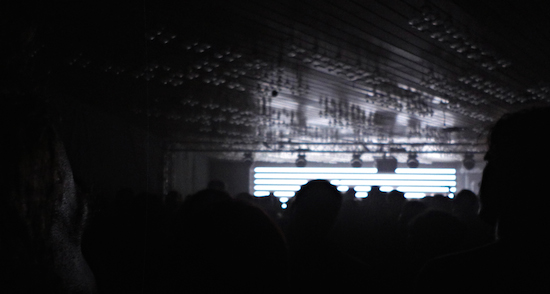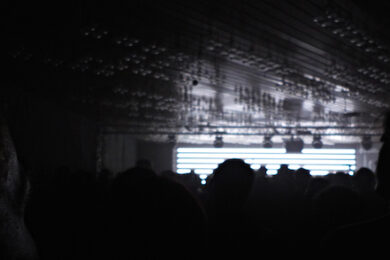Last week Warp Records celebrated its 25th birthday with a series of events in Krakow, hosted by Sacrum Profanum, including Squarepusher with the Sinfonietta Cracovia, a night of modern classical covers with Mira Calix and a full-roster rave including a preview of the new Aphex Twin album.
Festival promoters Sacrum Profanum’s mission is to blur high and low forms of art (hence the name) and the mix of classical evenings and knees up clubbing speak to some of the, not unproductive, tensions inherent in Warp itself. They are at once responsible for some of the most important dance music and subversive pop moments of the 90s and early 2000s, but also the more self-indulgent end of glitch and gabba, gesturing pompously towards the classical cannon and the fusion end of avant-garde jazz.
The later version of Warp is easy to caricature: "intelligent dance music" which yields more stroking of chins or writing of blogs than moving of feet; beats written by algorithm or based on flight paths of migratory birds, songs named after photocopier part numbers or species of spiders in Esperanto. But such excesses are easily forgiven considering the decisive contributions of acts like Autechre, Aphex Twin and Plaid on the history of electronic music.
Yet in the last 10 years, the dance world seemed to have turned away from Warp’s emphasis on technical prowess (either in terms of programming innovation or musical virtuosity) towards a focus on atmospherics and simpler compositions. Across the pond, dewy-eyed Americans have finally discovered "electronic" dance music (in no small part thanks to Warp) but like early ravers are transfixed by anything with a drop – the very antithesis of the Warp sound. The bleeding edge of the British avant-garde has migrated first to dubstep and then more ghostly ambient sounds and harsh, bare bones techno.
"But why is it in Poland?" everyone asks me in the week proceeding. "Aren’t they from Sheffield? Perhaps there’s something about the aesthetics of a post Warsaw Pact country which is conducive to Warp’s brand of dark and self-reflective music. In the northern city of Torun, where I am staying earlier in the week, the historic architecture is grand yet withered and pockmarked. Nearly every modern social housing block is splashed in happy pastel colours, now faded to the same register as the Warsaw sky. It is full of men staring out of windows.
The locals are concerned about a new fissure with Russia as a result of the Ukraine crisis. A Russian embargo on European produce means that Poland has an extreme apple surplus. This is probably a good thing because the only fruit I’ve eaten here is either in flavoured vodka or pierogi sauce and am worried I might get scurvy. We’re handed out apples on trains and in bars. Apples litter the streets. Children make snowmen out of them (probably). There’s also an under-publicised ‘war on gender’ in which conservative talk show hosts and the powerful Catholic right preach against the transgender and try to cure homosexuality, which sounds more like bible belt America than eastern Europe. It’s a very Catholic country and there are at least four statues of Pope John Paul II in this sleepy town, more than Copernicus or maybe even Jesus.
The trains are highly inefficient, stopping in the middle of fields where tractors wait to cross. It’s the old style continental compartment carriages where each time the power cuts out you expect a dead body to appear on the floor. On the interminable journey to Krakow I drop my only book down a crevice between the seats, never to be seen again. Luckily I grab a Stanislaw Lem collection in English in Warsaw station. His mix of passion and imagination and extreme cynicism sum up what I find so appealing about this country.
Everything feels brighter when I get to Krakow. The city seems to be benefiting from recent EU investments and an influx of tourism. The locals are both introspective and internationally facing and the city seems to be rousing from a slumber, like Berlin 10 years ago. Part of the buzz no-doubt has to do with the success of festivals like Sacrum Profanum and Unsound, which is also Krakow-based and centred around the amazing Hotel Forum – a derelict block nestled on the banks of the Wisla.
On the Saturday, as we approach the venue in a speeding cab, the black slab of Hotel, wreathed in fog, squats over us like an ancient alien spacecraft – before Prometheus ruined that image for everyone. Promoters Sacred Profanum run a tight (space)ship with clockwork efficiency minimal queues, sprawling outdoor areas, no-hassle bouncers, ample bars and flexible curfew.
We are greeted inside with a thicket of gently moving spot lights and hundreds of devotees sitting lotus-style worshiping a flickering Aphex logo. New album Syro, at least as pumped through this pristine sound system, is far more hectic than anticipated, more like a continuation of the acidy Analord series or at certain times even Ultimate Indicator.
Much like the equally anticipated My Bloody Valentine and Bowie albums last year, this offering is extremely competent but not world shaking. In fact the comparison with Bowie might be more apt because both Bowie and Richard D. James’s greatest innovations are largely parasitic on other styles of the time. There are no easy Burial pastiches or screwed up Blawan references for example, just no-nonsense dance music.
And yet no one is dancing, until of course a lone figure falls to his knees Platoon-style and bellows in ecstasy at one of the tracks. The crowd gradually starts bobbing in unison and applauding the vacant DJ booth. Later, the lone dancer, a jovial Slovakian, offers us a toke of his "White Russian" (apparently a mix of home grown White Widow and AK 47) and proclaims that you can’t experience Warp straight.
First up in room one, Battles inform us that they will be playing entirely new material. The three-piece continues to distance themselves from the quirky Tyondai Braxton-fronted pop songs of their first album into a kind of instrumental space funk. Most of the songs, borrowing some of the sound effects of their previous Gloss Drop, begin like someone arbitrarily shaking a box of toys but gradually coalesces into stomping synth driven grooves, not unlike Trans Am.
Rustie is a no show but Patten (at least it sounds like him) certainly delivers the goods in Room one, dropping retro synth lines which hang in the air like tacky chandeliers above undulating bass. We are momentarily teased with what sounds like Eastern European wedding music which speeds up into a real banger replete with far-away autotune vocals. This music is full of so many subtle inflections of styles that it’s positively impossible to date. Indeed with these diamond clear speakers this sounds like the future, just as Warp should.
When he’s done and the excited crowd start applauding he points to the back and with this gesture seems to fling a menacing drone from his speakers to an alternate stage at the back where LFO have already started, as if the sound man just flicked the crossfader on the whole room. (Take note, English festival promoters. Why does your room one not have two stages?)
LFO charge in with some abusive percussion, each additional bang seeming louder than the last. The Distijl-simple visuals strobe relentlessly like an electric flipbook being strummed in your face. Given the frame rate, this is the closest I’ll even get to being in the opening credits from Enter The Void. There are a staggering amount of accents in the room, no more than 10% English. From behind me a girl shouts "This. Is going. To make. You freak." like a Czeck robot. And sure enough that’s just what they play, followed by other classics like ‘LFO’ and ‘Mum-man’. Absolutely everyone is dancing now.
With barely enough time to catch our breath, the lights go out completely and we’re flanked by Autechre at the front who, in contrast to the crowd pleaser we just witnessed, fly the glitch flag with a quite baroque barrage of noises. The room is lit only by smart phone search lights scanning the carpet for escaped convicts, or maybe just escaped drugs. But as our retinas adjust to the dark and our ears to the audio, it suddenly becomes more danceable than I’ve heard Autechre deliver in a while. They move from truck engine growls and cascading clicks to the delicate sounds of clockwork automata being pulled limb from limb. Yet somehow, some totally absent, but insistent metronome seems to pulse under all the chaos, propelling the entire cheering crowd.
Everyone is on top form tonight, either due to the gravity of the occasion, the fantastic setting and effortless programming, or because they’re feeding off an audience who genuinely get it. All the punters I meet are passionate about the music but seemingly not bogged down by the endless naming of genres and sub-genres and the search for "the new", a particularly English affliction. Even the most obtuse and resolutely experimental music can be positively euphoric given the right setting and audience. They can dance with abandon without the aid of MCs, gimmicks, drops or even recognisable rhythms. As our Slovakian friend puts it: "this is challenging music. You have to deserve it".



